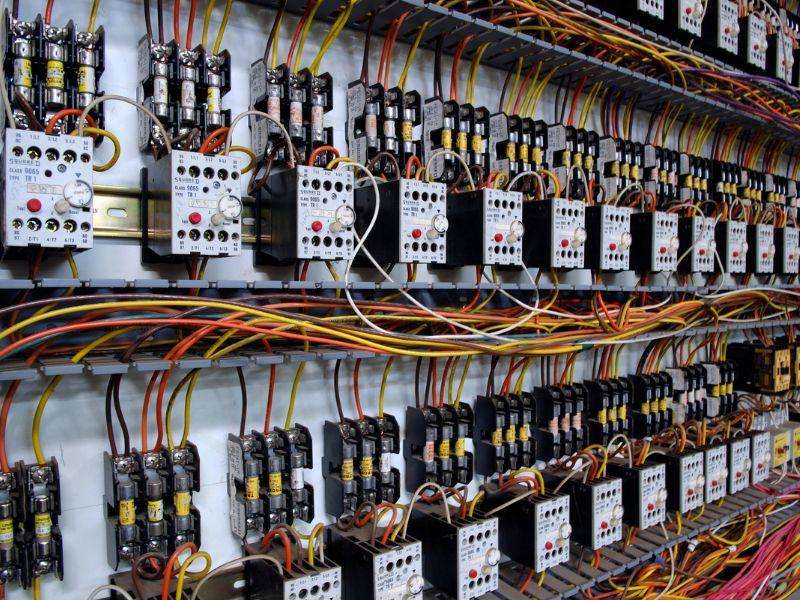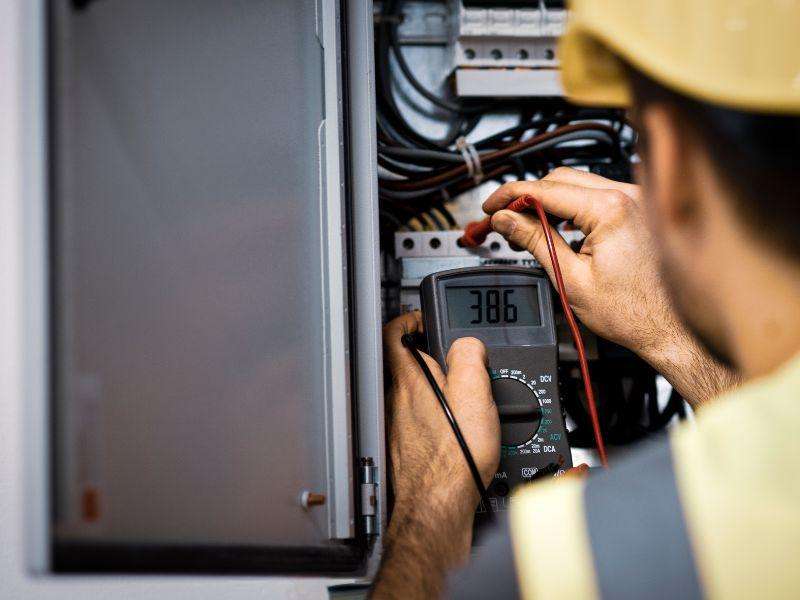Electrical panel change in Jacksonville, FL, can be an important step in maintaining the safety and efficiency of your home. Many older panels may not support the electrical demands of modern technology, leading to potential hazards or inconveniences. A successful electrical panel change ensures your home can handle your power needs while keeping everything safe.
Here in Jacksonville, we have access to several skilled professionals ready to help with panel upgrades and replacements. Companies in the area offer inspections and can guide you on the best options for your home’s electrical system. Whether it’s for safety or reliability, choosing the right electrical panel can give you peace of mind.
Before embarking on this process, it’s important to understand what it entails and how to plan for it effectively. From the initial assessment to the final installation, knowing each step ensures a smooth transition. Our goal is to provide clear and concise information to help you make informed decisions about your home’s electrical needs.

Key Takeaways
- Panel changes improve safety and efficiency.
- Local experts can guide you on the best options.
- Understanding the process ensures a smooth installation.
Understanding Electrical Panel Changes
Electrical panels are central to our home’s electricity. Upgrading them can improve safety and efficiency. Knowing when to replace your panel is crucial for maintaining a reliable electrical system.
Significance of Electrical Panel Upgrades
Upgrading an electrical panel enhances safety by ensuring it meets current standards. Older panels may struggle with modern energy demands, leading to potential hazards like short circuits and fires. In addition, new panels often support more circuits, offering greater flexibility for appliances and gadgets.
With an upgrade, we can handle increased electrical loads. This is especially important for homes adding more technology or undergoing renovations. Ensuring our panel is up-to-date also often increases property value, appealing to potential buyers who seek modern and safe homes.
Identifying the Need for a Panel Change
Recognizing when to change an electrical panel is vital. Frequent circuit breaker trips or flickering lights might indicate the panel’s struggle to handle the load. Burning smells or melted wires are more severe signals that require immediate attention.
Another factor is age. Panels over 25-30 years may not support today’s technology. Checking for recalls or safety issues with specific panel brands is wise. By addressing these signs early, we can prevent potential hazards and maintain an efficient electrical system for our household needs.
Selecting the Right Electrical Panel
When choosing an electrical panel, we should consider the types available and ensure we select one that fits our specific power needs and safety requirements. Proper sizing and understanding panel specifications are crucial for efficiency and safety.
Types of Electrical Panels
Electrical panels, also known as breaker panels, come in several types. Main breaker panels are the most common in homes. They control all the circuits and can shut power off throughout the house with a single switch. Another type is the main lug panel, which does not have a main breaker; it connects directly to the meter. These are often used as sub-panels.
Sub-panels are used to distribute power to specific areas within a building, providing additional circuit capacity. Lastly, transfer switches are panels that work with generators, offering a backup power source during outages. Choosing the right type depends on the function needed and the structure’s requirements.
Panel Specifications and Sizing
When selecting an electrical panel, we must also consider the specifications, such as the number of circuits and amperage capacity. Common capacities include 100, 150, or 200 amps, with 200 amps being recommended for many modern homes due to higher power demands.
The panel should fit the energy consumption of the house, accommodating all current circuits and future expansions. Safety ratings, such as UL listings, ensure the panel meets safety standards. We must check that the panel is compatible with our electrical system’s voltage and designed for indoor or outdoor use, as needed. Proper sizing eliminates the risk of overloads and improves overall safety.
Planning and Preparation
When planning to change an electrical panel in Jacksonville, FL, it’s crucial to focus on safety procedures and the necessary permits. These steps ensure the electrical work maintains compliance and minimizes risks.
Safety Considerations and Procedures
We start by emphasizing safety, a key aspect in any electrical panel change. It’s necessary to turn off all power at the main breaker before beginning any work. This prevents electrical shocks. Personal protective equipment (PPE), such as gloves and safety glasses, should always be used to reduce injury risks.
Additionally, it’s important to ensure all tools are properly insulated. No metal jewelry or watches should be worn during the process. Voltage testers are essential tools to confirm circuits are inactive before commencing with the work. This helps prevent accidental electrical contact.
Permit Requirements in Jacksonville FL
Before upgrading an electrical panel, obtaining the right permits is mandatory in Jacksonville. We are required to apply through the local building department. These permits ensure that our upgrades meet local building codes.
Professionals often handle this permit application as part of their services. However, it is possible to apply on your own if you’re familiar with the necessary paperwork. This includes documenting the planned changes and showing compliance with safety standards. Having the right permits helps us avoid penalties and ensures that the work is recognized and approved by local authorities. Consequently, it maintains the integrity and safety of our electrical systems.

The Replacement Process
Replacing an electrical panel in Jacksonville involves careful planning and execution. It is crucial to follow the necessary steps and ensure compliance with local regulations to maintain safety and functionality.
Step-by-Step Guide to Electrical Panel Change in Jacksonville
First, we conduct an initial assessment of your current electrical panel to identify issues and determine the appropriate type of replacement. This includes checking the panel’s age, capacity, and condition. Safety is our priority. We ensure that power is turned off before beginning any work to protect everyone involved.
Once the assessment is complete, we remove the old panel carefully, disconnecting all associated wiring. We then install the new panel, ensuring it meets the electrical needs of your home or building. Our electricians test each connection for correct installation and functionality.
Finally, we take time to explain the new panel’s operation to you and provide any necessary documentation. We also offer advice on future maintenance to help keep your panel in good working order.
Quality and Compliance Assurance
At every stage of the process, compliance with local Jacksonville regulations and the National Electrical Code is essential. We obtain all required permits and arrange for any inspections needed to meet legal standards. Our team has the necessary training and certification, so you can be confident in our work.
We use high-quality materials to ensure the durability and reliability of the new electrical panel. Regular inspections and adherence to guidelines help prevent electrical hazards. Our commitment is to install every panel right the first time, providing peace of mind and safety for our clients.
After the Installation
Once the electrical panel is changed, our job isn’t quite done. We must ensure that everything functions properly and all necessary documentation is recorded and filed carefully.
Final Inspection and Testing
After installing the new panel, we conduct a thorough inspection of the entire system. This process involves checking each connection and circuit to ensure they are secure and functioning as expected. We use specialized tools and equipment to test for any potential issues like voltage drops or improper configurations.
Testing is crucial to verify that the system is safe and efficient. During this phase, we also check for any signs of damage or wear in existing electrical components that were not replaced.
Ensuring every part is correctly installed and working as it should is essential.
Panel Change Documentation and Record Keeping
Once inspections and tests are complete, we focus on documentation. We record the details of the installation, including the panel type, model, and any changes made to the wiring or circuit layouts. This information is critical for future reference and troubleshooting.
Accurate record-keeping helps us and the homeowner track system components and any modifications. We also provide homeowners with a copy of these records, ensuring they have the information needed for maintenance or upgrades.
Proper documentation ensures that everything is properly documented and accounted for, aiding in efficiency and safety.
Frequently Asked Questions
Changing an electrical panel can improve safety and reliability in a residential property. In Jacksonville, factors like cost, timelines, and legal requirements are important to know. Selecting a dependable electrician is also key.
What are the signs that I need to change my electrical panel in a residential property?
Signs that you might need to change your electrical panel include frequent breaker trips, flickering lights, and unusual buzzing sounds. If your panel is old or made by a company like Federal Pacific or Zinsco, it may not meet current safety standards.
How much does it usually cost to replace an electrical panel in Jacksonville, FL?
The cost to replace an electrical panel in Jacksonville can range from $1,200 to $3,500. This depends on factors like the complexity of the job, the type of panel you choose, and the electrician’s rates.
Are there any legal or code requirements for changing an electrical panel in Jacksonville?
Yes, there are specific codes and regulations we must follow when changing an electrical panel in Jacksonville. This ensures the safety and reliability of electrical systems. Working with licensed electricians familiar with local codes is essential.
What is the typical timeline for an electrical panel upgrade project in Jacksonville?
A typical electrical panel upgrade in Jacksonville can take between one to three days. The timeline depends on the complexity of the installation and any additional wiring or repairs needed.
How do I choose a reliable electrician for an electrical panel change in Jacksonville?
To find a reliable electrician, look for licensed professionals with good reviews and testimonials. A local electrician familiar with Jacksonville codes will be beneficial. Getting multiple estimates can also help us make an informed decision.
Can an electrical panel change increase the value of my home?
Yes, upgrading an outdated or unsafe electrical panel can increase your home’s value. It enhances safety and can make the home more attractive to potential buyers who value modern, up-to-date systems.






